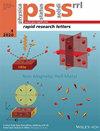Modified electronic structure of amorphous Mn‐Si‐Te for OTS application: Improved thermal stability by the formation of Mn‐Te bonding
IF 2
4区 物理与天体物理
Q3 MATERIALS SCIENCE, MULTIDISCIPLINARY
引用次数: 0
Abstract
A critical element within the 3D Xpoint architecture is the Ovonic threshold switch (OTS) material, which serves a crucial role as a selector. The development of novel OTS materials devoid of hazardous elements such as As and Se is imperative for mitigating environmental impact. The Si‐Te binary telluride is a representative As/Se‐free OTS material, demonstrating stable switching. However, its thermal stability is insufficient for enduring annealing processes in semiconductor manufacturing. To address this challenge, this study proposes the incorporation of Mn into the Si‐Te alloy. While the introduction of transition metals into chalcogenide glass typically reduces the electrical resistivity, potentially compromising the ON/OFF ratio, the off current for the device containing 26 at.% Mn is observed to be lower than that for the undoped Si‐Te device. Furthermore, the thermal stability of the Mn‐Si‐Te film surpasses that of its pristine counterpart. X‐ray photoelectron spectroscopy and density functional theory simulations provide evidence of Mn‐Te bonding formation in the Mn‐Si‐Te amorphous alloy, thus suggesting the role of Mn‐Te bonding in enhancing thermal stability. These findings provide a promising avenue for the advancement of novel OTS materials.This article is protected by copyright. All rights reserved.用于 OTS 的非晶态锰-硅-碲的改良电子结构:通过形成 Mn-Te 键提高热稳定性
三维 Xpoint 架构中的一个关键元件是奥沃尼克阈值开关 (OTS) 材料,它作为选择器发挥着至关重要的作用。为了减轻对环境的影响,开发不含砷、硒等有害元素的新型 OTS 材料势在必行。Si-Te 二元碲化镉是一种具有代表性的不含砷/硒的 OTS 材料,具有稳定的开关性能。然而,它的热稳定性不足以承受半导体制造过程中的退火工艺。为应对这一挑战,本研究提出在 Si-Te 合金中加入锰。虽然在钙化玻璃中引入过渡金属通常会降低电阻率,从而可能影响导通/关断比,但据观察,含 26%锰的器件的关断电流低于未掺杂的 Si-Te 器件。此外,Mn-Si-Te 薄膜的热稳定性超过了原始薄膜。X 射线光电子能谱和密度泛函理论模拟提供了在 Mn-Si-Te 非晶合金中形成 Mn-Te 键的证据,从而表明 Mn-Te 键在增强热稳定性中的作用。这些发现为新型 OTS 材料的发展提供了一条前景广阔的途径。本文受版权保护。
本文章由计算机程序翻译,如有差异,请以英文原文为准。
求助全文
约1分钟内获得全文
求助全文
来源期刊

Physica Status Solidi-Rapid Research Letters
物理-材料科学:综合
CiteScore
5.20
自引率
3.60%
发文量
208
审稿时长
1.4 months
期刊介绍:
Physica status solidi (RRL) - Rapid Research Letters was designed to offer extremely fast publication times and is currently one of the fastest double peer-reviewed publication media in solid state and materials physics. Average times are 11 days from submission to first editorial decision, and 12 days from acceptance to online publication. It communicates important findings with a high degree of novelty and need for express publication, as well as other results of immediate interest to the solid-state physics and materials science community. Published Letters require approval by at least two independent reviewers.
The journal covers topics such as preparation, structure and simulation of advanced materials, theoretical and experimental investigations of the atomistic and electronic structure, optical, magnetic, superconducting, ferroelectric and other properties of solids, nanostructures and low-dimensional systems as well as device applications. Rapid Research Letters particularly invites papers from interdisciplinary and emerging new areas of research.
 求助内容:
求助内容: 应助结果提醒方式:
应助结果提醒方式:


